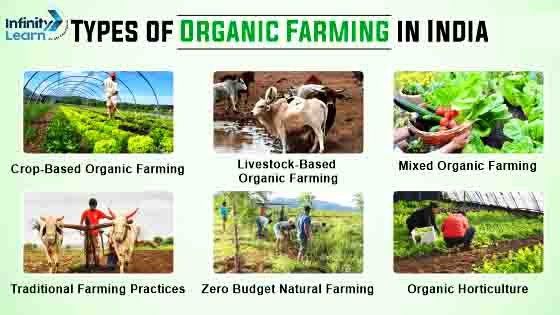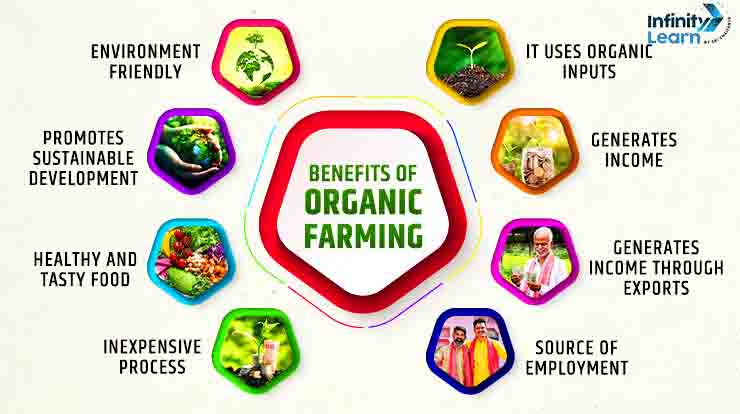Table of Contents
Recently, harmful pesticides and fertilizers are endangering lives. With India’s rising population, the demand for food is increasing, leading to greater use of chemical fertilizers, toxic pesticides, and hybrids, which harm both human health and the environment. Organic farming emerges as a crucial method to safeguard health and nature from these harmful chemicals. Awareness about organic farming is growing among Indian farmers.
Organic farming isn’t a new concept in India. It focuses on maintaining soil health by using organic waste, crop residues, animal manure, and other natural materials. If you’re curious about how to practice effective organic farming, this blog will guide you through the best methods to achieve it.

What is Organic Farming in India
Organic farming in India focuses on using natural pest control methods and organic inputs like manure and plant waste. It emerged as a response to the environmental damage caused by chemical pesticides and synthetic fertilizers. This agricultural approach aims to restore and enhance ecological balance while being environmentally sustainable and socially responsible. Organic products are often certified by regulatory bodies to ensure they meet natural standards, providing consumers with assurances of authenticity and quality.
History of Organic Farming In India
Organic farming harks back to ancient agricultural methods that utilized natural techniques for growing crops. Many civilizations historically practiced organic agriculture.
In the early 20th century, concerns about the detrimental effects of industrialization and synthetic chemicals on farming and the environment revived interest in organic farming. Sir Albert Howard, known as the father of modern organic agriculture, conducted significant research in India during the 1920s and 1930s. His work highlighted the importance of soil health, composting, and biological pest control.
Also Read: Difference Between Herbicides and Pesticides
Types of Organic Farming
Below are the types of organic farming in India-

1. Crop-Based Organic Farming
Crop-based organic farming focuses on growing crops without synthetic chemicals or genetically modified organisms (GMOs). This method emphasizes the use of organic fertilizers like compost and green manure, as well as natural pest control methods.
The aim is to maintain soil fertility and reduce environmental impact. Techniques such as crop rotation and intercropping are often employed to enhance biodiversity and soil health. By relying on natural processes, crop-based organic farming seeks to produce high-quality, chemical-free crops while preserving ecological balance.
Also Check: Biopesticides
2. Livestock-Based Organic Farming
In livestock-based organic farming, animals are raised in environments that mimic their natural habitats, ensuring their health and well-being. This method avoids the use of synthetic hormones and antibiotics, focusing instead on natural feed and veterinary care.
The integration of livestock with crop production enhances nutrient cycling and reduces the need for chemical inputs. Manure from animals is used as a natural fertilizer for crops, promoting soil health and reducing waste. Livestock-based organic farming supports sustainable farming practices by maintaining soil fertility and improving farm resilience.
3. Mixed Organic Farming
Mixed organic farming combines both crop and livestock production in a single system. This integrated approach allows for a more holistic management of resources and can enhance farm sustainability. By combining crops and animals, farmers can utilize animal manure as a natural fertilizer for crops and employ crop residues as feed for livestock.
This method promotes nutrient recycling, reduces dependency on external inputs, and enhances farm biodiversity. Mixed organic farming supports ecological balance and improves the efficiency of resource use on the farm.
Also Check: Crop Protection
4. Traditional Farming Practices
Traditional farming practices involve methods that have been passed down through generations and are often tailored to local conditions. These practices emphasize the use of locally available resources, minimal external inputs, and a deep understanding of the local ecosystem.
Techniques such as crop rotation, agroforestry, and manual pest control are commonly employed. Traditional farming practices are sustainable and resilient, often resulting in diverse and productive farming systems that maintain soil health and biodiversity while respecting cultural heritage.
5. Zero Budget Natural Farming (ZBNF)
Zero Budget Natural Farming (ZBNF) is a method that aims to reduce the financial cost of farming to zero by eliminating the need for external inputs. This approach emphasizes the use of locally available resources, such as cow dung and urine, to create natural fertilizers and pest repellents.
ZBNF promotes soil health through practices like mulching, composting, and promoting beneficial microorganisms. By focusing on self-sufficiency and sustainability, ZBNF aims to lower production costs and enhance farm resilience while preserving ecological balance.
6. Organic Horticulture
Organic horticulture involves the cultivation of fruits, vegetables, and flowers using organic methods. This approach avoids synthetic pesticides and fertilizers, instead utilizing natural inputs such as compost, manure, and organic soil amendments. Organic horticulture focuses on maintaining soil health, encouraging beneficial insects, and using crop rotation to manage pests and diseases.
This method supports biodiversity and produces high-quality, chemical-free produce. By adhering to organic principles, horticulturists aim to create sustainable, eco-friendly farming systems that benefit both the environment and consumers.
Organic Farming Techniques In India
1. Crop Rotation
Crop rotation involves growing different types of crops in the same area in sequential seasons. This technique helps maintain soil fertility, control pests and diseases, and reduce the buildup of soil-borne pathogens. In India, crop rotation includes alternating between legumes, grains, and vegetables. For example, after harvesting rice, farmers might plant pulses like chickpeas, which enhance soil nitrogen levels. This method promotes soil health and reduces the need for synthetic fertilizers.
2. Composting
Composting is the process of decomposing organic matter like kitchen waste, animal manure, and plant residues to create nutrient-rich compost. In India, composting is crucial for replenishing soil nutrients and improving soil structure. Traditional methods include using cow dung, which is rich in organic matter and beneficial microorganisms. Compost is applied to the soil to enhance its fertility and water-holding capacity, promoting healthy plant growth without relying on chemical fertilizers.
3. Green Manuring
Green manuring involves growing specific plants, such as legumes or grasses, and then incorporating them into the soil to enhance its organic content. In India, green manures like sunn hemp or cowpea are often used. These plants fix atmospheric nitrogen into the soil, improve soil structure, and add organic matter. Green manuring helps in reducing the need for chemical fertilizers and enhances soil fertility naturally.
4. Integrated Pest Management (IPM)
Integrated Pest Management is a holistic approach to managing pests through biological, physical, and cultural practices rather than relying solely on chemical pesticides. In India, IPM techniques include using natural predators like ladybugs and neem oil to control pests, practicing trap cropping, and monitoring pest populations regularly. This method helps maintain ecological balance and reduces the reliance on synthetic pesticides.
5. Organic Certification
Organic certification ensures that farming practices meet specific organic standards, such as avoiding synthetic pesticides and fertilizers. In India, certification bodies like the National Program for Organic Production (NPOP) and international organizations provide guidelines and certification. Farmers undergo rigorous inspections and follow standards to receive organic certification, which allows them to market their produce as organic and access premium markets.
6. Agroforestry
Agroforestry integrates trees and shrubs with crops and livestock on the same land. In India, agroforestry practices include growing fruit trees, such as mangoes or guavas, alongside crops like wheat or rice. This technique provides multiple benefits, including enhanced biodiversity, improved soil health, and additional income sources. Agroforestry systems contribute to sustainable land management and environmental conservation.
7. Natural Pest Repellents
Natural pest repellents, such as neem oil, garlic sprays, and turmeric, are used in organic farming to deter pests and diseases. In India, neem oil is a widely used natural pesticide derived from the neem tree. It effectively repels a variety of pests and has antifungal properties. Other traditional methods include using marigold flowers as pest repellents or creating herbal concoctions to protect crops.
8. Mulching
Mulching involves covering the soil with organic materials like straw, leaves, or grass to conserve moisture, suppress weeds, and improve soil fertility. In India, mulching is commonly used in organic farming to enhance soil health and reduce water evaporation. Organic mulches also provide nutrients as they decompose, contributing to the overall health of the soil and reducing the need for chemical inputs.
9. Seed Selection and Preservation
Selecting and preserving traditional and indigenous seed varieties is crucial for maintaining biodiversity and adapting to local conditions. In India, farmers use heirloom seeds that are well-suited to their local environment and have been passed down through generations. This practice helps preserve genetic diversity, ensures resilience against pests and diseases, and supports sustainable farming practices.
10. Water Management
Effective water management is essential for organic farming, especially in regions with water scarcity. In India, techniques like rainwater harvesting, drip irrigation, and the use of contour plowing are employed to optimize water use. These methods reduce water wastage, enhance soil moisture retention, and ensure that crops receive adequate hydration without over-reliance on chemical inputs.
Advantages Of Organic Farming In India
Here are some advantages of organic farming in India-
1. Environmental Sustainability
Organic farming significantly benefits the environment by reducing pollution and promoting biodiversity. Unlike conventional farming, which relies heavily on synthetic pesticides and fertilizers, organic farming utilizes natural inputs such as compost, green manure, and biological pest control.
This reduces soil and water pollution, as organic methods do not introduce harmful chemicals into the ecosystem. Additionally, organic farming practices like crop rotation and polyculture enhance soil health and prevent erosion. Studies have shown that organic farming can improve soil structure and increase water retention, contributing to sustainable land management.
2. Health Benefits
Organic farming reduces the risk of exposure to harmful chemicals for both farmers and consumers. Conventional farming uses synthetic pesticides and fertilizers, which can remain as residues on produce and potentially affect human health. Organic farming avoids these chemicals, relying on natural methods to manage pests and enrich soil.
This approach not only reduces the risk of pesticide-related health issues but also improves the nutritional quality of food. Research indicates that organic produce can have higher levels of certain nutrients, including antioxidants.
3. Economic Viability for Farmers
Organic farming can be economically advantageous for farmers. Although initial costs for organic certification and inputs might be higher, the long-term benefits include improved soil fertility and reduced dependency on costly chemical inputs. Organic products often command higher prices in the market, which can increase farmers’ income.
Furthermore, organic farming can reduce the financial risks associated with price fluctuations of synthetic inputs and crop failures due to soil degradation. Additionally, organic farming promotes local and sustainable practices, which can support rural economies.
4. Soil Health and Fertility
One of the most significant advantages of organic farming is its positive impact on soil health and fertility. Organic farming practices, such as composting, green manuring, and reduced tillage, enhance soil structure and increase its organic matter content. This improves the soil’s ability to retain moisture and nutrients, which supports healthier crop growth.
Healthy soils also have better microbial diversity, which contributes to natural pest control and disease suppression. Over time, organic practices can restore degraded soils and improve overall land productivity.
5. Preservation of Biodiversity
Organic farming supports biodiversity by avoiding monoculture and promoting a diverse range of plants and animals. This diversity creates a more resilient ecosystem that can better withstand pests, diseases, and environmental stressors. Organic farms often include hedgerows, cover crops, and natural habitats that provide shelter and food for beneficial organisms such as pollinators and predators. This biodiversity contributes to ecosystem stability and can enhance agricultural productivity over the long term.
Organic farming in India presents numerous advantages, from environmental sustainability and health benefits to economic viability and improved soil health. By supporting biodiversity and promoting sustainable practices, organic farming contributes to a healthier planet and a more resilient agricultural system.
Benefits Of Organic Farming In India

- Environmentally favorable.
- Encourages development that is sustainable.
- Delicious and healthful food.
- Budget Friendly
- Additionally, it makes use of natural resources.
- Generate revenue
- It also generate revenue by way of exports.
- Employment source.
10 Organic Farming State In India
| State | Overview | Key Features |
| Sikkim | First fully organic state in India; implemented a comprehensive policy. | National and international recognition; state-wide organic transition. |
| Himachal Pradesh | Significant proponent of organic farming; focuses on fruits and vegetables. | Government subsidies and technical assistance for organic practices. |
| Uttarakhand | Organic farming in various regions; promotes sustainable practices. | Support through schemes and focus on herbs and vegetables. |
| Kerala | Growing organic sector; known for spices, fruits, and vegetables. | Government initiatives; organic certifications. |
| Nagaland | Adoption of organic practices for vegetables and fruits; traditional methods. | Various programs and support schemes for organic farming. |
| Arunachal Pradesh | Moving towards organic farming for rice and vegetables. | Support for organic production; increasing organic practices. |
| Mizoram | Rise in organic farming; focus on vegetables and fruits. | Training and support for transitioning farmers. |
| Assam | Organic practices in tea plantations and vegetable cultivation. | Promotion of organic tea production; assistance for farmers. |
| Tripura | Promoting organic practices; focus on fruits and vegetables. | Support through government schemes and programs. |
| Madhya Pradesh | Organic farming adoption in several districts; focus on soil health. | Incentives and support for sustainable practices. |
FAQs on Organic Farming In India
Is organic farming successful in India?
Yes, organic farming is increasingly successful in India, with many states adopting sustainable practices and seeing growth in organic produce.
Which state is famous for organic farming in India?
Sikkim is renowned as India's first fully organic state, having implemented comprehensive organic practices statewide.
What are the four types of organic farming?
The four types of organic farming include pure organic, integrated organic, biodynamic farming, and natural farming.
What is the importance of organic farming in India?
Organic farming is crucial in India for improving soil health, reducing chemical usage, enhancing biodiversity, and providing safer food options.
What is the first organic farming state in India?
Sikkim is recognized as the first state in India to achieve full organic status.
What is the growth of organic farming in India?
Organic farming in India has seen substantial growth, with increasing acreage, government support, and a rising market for organic produce.









